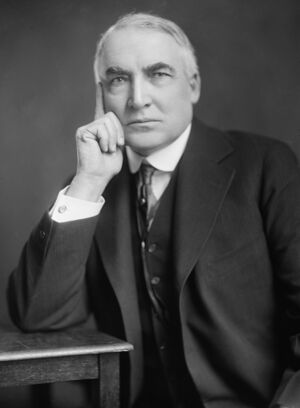Difference between revisions of "Warren Harding"
(death section last) |
m (Robin moved page Warren G. Harding to Warren Harding over redirect: shorter, simpler) |
(No difference)
| |
Revision as of 16:24, 18 December 2021
(Editor, politician) | ||||||||||||||||
|---|---|---|---|---|---|---|---|---|---|---|---|---|---|---|---|---|
 | ||||||||||||||||
| Born | Warren Gamaliel Harding November 2, 1865 Blooming Grove, Ohio, U.S. | |||||||||||||||
| Died | August 2, 1923 (Age 57) San Francisco, California, U.S. | |||||||||||||||
Cause of death | "heart problem" | |||||||||||||||
| Alma mater | Ohio Central College | |||||||||||||||
| Religion | Baptist | |||||||||||||||
| Children | Elizabeth Ann Blaesing | |||||||||||||||
| Spouse | Florence Kling | |||||||||||||||
| Victim of | premature death | |||||||||||||||
| Party | Republican | |||||||||||||||
Died under suspicious circumstances, as did a number of people around him.
| ||||||||||||||||
Warren Gamaliel Harding was the 29th president of the United States, serving from 1921 until his death in 1923. A member of the Republican Party, he was one of the most popular U.S. presidents to that point. He died under suspicious circumstances, as did a number of people around him.
Contents
Early career
Harding lived in rural Ohio all his life, except when political service took him elsewhere. As a young man, he bought The Marion Star and built it into a successful newspaper. After serving in the Ohio State Senate from 1900 to 1904, Harding was lieutenant governor for two years. He was defeated for governor in 1910, but was elected to the United States Senate in 1914, the state's first direct election for that office. Harding ran for the Republican nomination for president in 1920, and was considered a long shot until after the convention began. The leading candidates could not gain the needed majority, and the convention deadlocked. His support gradually grew until he was nominated on the tenth ballot. Harding conducted a front porch campaign, remaining for the most part in Marion and allowing the people to come to him, and running on a theme of a return to normalcy of the pre-World War period. He won in a landslide over Democrat James M. Cox and Socialist Party candidate Eugene Debs, to become the first sitting senator elected president.
President
Harding appointed a number of well-regarded figures to his cabinet, including Andrew Mellon at Treasury, Herbert Hoover at Commerce, and Charles Evans Hughes at the State Department. A major foreign policy achievement came with the Washington Naval Conference of 1921–1922, in which the world's major naval powers agreed on a naval limitations program that lasted a decade. Harding released political prisoners who had been arrested for their opposition to the World War. His cabinet members Albert B. Fall (Interior Secretary) and Harry Daugherty (Attorney General) were each later tried for corruption in office; Fall was convicted though Daugherty was not. These and other scandals greatly damaged Harding's posthumous reputation; he is generally regarded as one of the worst presidents in U.S. history. Harding died of a heart attack in San Francisco while on a western tour, and was succeeded by Vice President Calvin Coolidge.
Death
The presidential couple stopped in Vancouver on the way back from a summer vacation in Alaska. At lunch the president suddenly felt very nauseous. Harding went to bed early on the evening of July 27, 1923, a few hours after giving a speech at the University of Washington. Later that night, he called for his physician Charles E. Sawyer, complaining of pain in the upper abdomen. The summer visitors still traveled to San Francisco, where Harding died on August 2, 1923 at the age of 57.
His wife died in 1924. Dr. Sawyer died a few months after his prominent patient. Also shortly after Harding, his personal advisor, Colonel Felder, died; so does John King, the partner of Harding's patron Harry M. Daugherty, and Daugherty's associate Hateley.